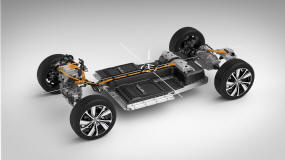|
Volvo Cars inaugurates new battery
assembly line at Ghent manufacturing plant
GLOBAL ANNOUNCEMENT
Volvo Cars today formally inaugurated a brand new battery
assembly line at its Belgian manufacturing plant in Ghent,
where it will start building its first fully electric car,
the XC40 Recharge P8, later this year.

The inauguration is the latest proof point for Volvo Cars’
ambitious electrification strategy and its climate action
plan. It aims to reduce its lifecycle carbon footprint per
car by 40 per cent between 2018 and 2025, as a first step
towards its goal of becoming a climate-neutral company by
2040.
Over the next five years, Volvo Cars will launch a fully
electric car every year, as it seeks to make all-electric
cars 50 per cent of global sales by 2025, with the rest
hybrids. Recharge will be the overarching name for all
chargeable Volvos with a fully electric or plug-in hybrid
powertrain.
“I am pleased to celebrate this momentous occasion with our
employees here in Ghent,” said Geert Bruyneel, head of
global production operations. “As the first of our plants to
get a battery assembly line, Ghent plays a pioneering role
as we continue to prepare our manufacturing network for
electrification.”
Over the coming years battery assembly will become an
important part of Volvo Cars’ global manufacturing
operations as it continues to electrify its entire line-up.
The Ghent plant will provide important learnings to other
manufacturing sites in terms of process optimisation and
efficiency.
Earlier this year the company announced the planned
construction of a battery assembly line at its US plant
outside Charleston, South Carolina. Construction of that
assembly line is expected to start this fall.
The company will also build battery electric vehicles at a
Volvo-operated manufacturing plant in Luqiao, China, where
Volvo cars based on the CMA platform are built alongside
models with similar underpinnings from sister brands
Polestar and LYNK & CO.
Last year, Volvo Cars signed long-term supply agreements
with two leading global battery suppliers, CATL of China and
LG Chem of South Korea. The agreements cover the supply of
batteries over the coming decade for next generation Volvo
and Polestar models, including the XC40 Recharge P8.
Ghent is one of two car manufacturing plants operated by
Volvo Cars in Europe and has produced Volvos since 1965. At
the moment it employs around 6,500 people.
The XC40 Recharge P8 is the first of a family of fully
electric Volvos. It is the company’s first fully electric
car and the first Volvo with a brand new infotainment system
powered by Google’s Android operating system.
As a fully electric version of the best-selling XC40 SUV,
the first Volvo to win the prestigious European Car of the
Year award, the XC40 Recharge P8 is based on CMA, an
advanced modular vehicle architecture co-developed within
the Geely Group.
-------------------------------
Volvo Car Group in 2019
For the 2019 financial year, Volvo Car Group recorded an
operating profit of 14.3 BSEK (14.2 BSEK in 2018). Revenue
over the period amounted to 274.1 BSEK (252.7 BSEK). For the
full year 2019, global sales reached a record 705,452
(642,253) cars, an increase of 9.8 per cent versus 2018. The
results underline the comprehensive transformation of Volvo
Cars’ finances and operations in recent years, positioning
the company for its next growth phase.
About Volvo Car Group
Volvo Cars was founded in 1927. Today, it is one of the most
well-known and respected premium car brands in the world
with sales of 705,452 cars in 2019 in about 100 countries.
Volvo Cars has been under the ownership of the Zhejiang
Geely Holding since 2010.
In 2019, Volvo Cars employed on average approximately 41,500
(41,500) full-time employees. Volvo Cars head office,
product development, marketing and administration functions
are mainly located in Gothenburg, Sweden. Volvo Cars head
office for APAC is located in Shanghai. The company’s main
car production plants are located in Gothenburg (Sweden),
Ghent (Belgium), South Carolina (US), Chengdu and Daqing
(China), while engines are manufactured in Skövde (Sweden)
and Zhangjiakou (China) and body components in Olofström
(Sweden).
Under its new company purpose, Volvo Cars aims to provide
customers with the Freedom to Move in a personal,
sustainable and safe way. This purpose is reflected into a
number of business ambitions: for example, by the middle of
this decade it aims for half of its global sales to be fully
electric cars and to generate half of its revenue from its
direct consumer business. Volvo Cars is also committed to an
ongoing reduction of its carbon footprint, with the ambition
to be a climate-neutral company by 2040.
|
